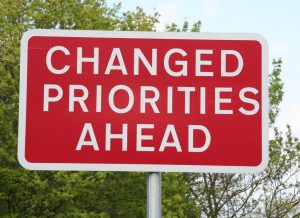 The past few months of weathering the pandemic, and living with social, political and economic upheaval, have also acted as a time for reflection and reconsideration of what really matters to us. Where ever you are in your career, you may be re-calibrating your priorities.
The past few months of weathering the pandemic, and living with social, political and economic upheaval, have also acted as a time for reflection and reconsideration of what really matters to us. Where ever you are in your career, you may be re-calibrating your priorities.
As we enter the summer months and (hopefully) take some time to restore our bodies and minds, this could be a good time to reflect on what your priorities are, and how they may have shifted. After months of sheltering in place, weeks of home-schooling, and days of working remotely or not at all, what truly matters?
Here are some areas to consider:
Work hours
Before the pandemic, were you a constant worker bee? Did you look at work email before getting out of bed every morning? Did you refuse to take breaks or vacations? Were you the person who closed the office at night and worked every weekend?
Perhaps you have come to realize that such a compulsive approach to work took a toll on your body and mind, and interfered with your family life. Maybe now it’s important to incorporate breaks during the day, exercise during the week, and plan non-work activities over the weekend.
Eating habits
I know this may sound weird, but I can’t tell you how many people have told me that they’ve changed their relationship to eating and food. Pre-pandemic were you the king or queen of take-out? Did you purchase most of your meals via take out or dining out? Was your refrigerator a place to store cold water, leftovers, and batteries?
Perhaps, like many of the people I’ve spoken with, you’ve learned to cook and prepare meals at home. You actually like the experience of making your own food. Maybe you’ve become skilled at shopping for fresh produce and healthier snacks. Your new priority may entail continuing along this path, transforming mealtime to a more nourishing, creative experience.
Climbing the corporate ladder
Ambition and drive are a great thing. But a number of my clients have been reflecting on the cost of always trying to get ahead. Before the pandemic and the protests pointing to institutional racism, it was easy to simply believe that what mattered in terms of professional development was getting that next promotion, or successfully navigating company politics.
Today, you may be reconsidering the value of complying with company politics at the cost of your values. If equity, diversity and inclusion matter to you, it may be essential for you to participate in campaigns, meetings, education, company initiatives to address this issue. There may be other aspects of your company culture that you’re no longer willing to tolerate for the sake of advancement.
Family life
While it was easy pre-pandemic to give lip service to family life, many hardworking professionals felt a constant tension between fulfilling the demands of their careers, and tending to their families. They expressed regret for missing so many important moments at home but rationalized that the extensive travel and long hours at the office were a necessary evil in order to fund their lives. Were you one of those people?
These days, I’ve heard a number of professionals admit that while being grounded at home has been stressful in terms of juggling work, family, and personal time, they have also become better acquainted and more appreciative of every member of the family. Perhaps the new priority will be retaining and sustaining some of that family closeness by reducing time away for work.
These are just a few areas to think about. You may have other priorities that have come to your attention in terms of what matters to you now regarding your career, and the role work plays in your life. Whatever they are, I invite you to reflect on what matters to you this summer. Better priorities could be one of the gifts of these trying times.
Katherine Crowley – Career Therapist and co-owner of K Squared Enterprises.
Contact us at info@mycrazyoffice.co for any further help around this topic.

 A social contract is an unofficial agreement shared by everyone in a society in which they give up some freedom for security. The philosopher Jean-Jacques Rousseau popularized the idea of the social contract in the 1700s, but it’s just as applicable today. A good example is when we go to the airport and go through security. We may not like it, but we understand that it’s a freedom we give up for the benefit of safety in our society.
A social contract is an unofficial agreement shared by everyone in a society in which they give up some freedom for security. The philosopher Jean-Jacques Rousseau popularized the idea of the social contract in the 1700s, but it’s just as applicable today. A good example is when we go to the airport and go through security. We may not like it, but we understand that it’s a freedom we give up for the benefit of safety in our society. With all of the upheaval and uncertainty we are facing, it can be more challenging than ever to be in the present moment.
With all of the upheaval and uncertainty we are facing, it can be more challenging than ever to be in the present moment. You are probably facing some difficult conversations at work regarding Diversity, Equity and Inclusion (DEI). If not, you should be. Now is the time.
You are probably facing some difficult conversations at work regarding Diversity, Equity and Inclusion (DEI). If not, you should be. Now is the time.  As some of the restrictions due to the COVID-19 pandemic begin to lift, and some people cautiously begin to return to their work environments, we are tasked with the job of managing yet another period of transition. It is the transition from the safety and predictability of our quarantined home environments to the uncertainty and potential risks of the outside world.
As some of the restrictions due to the COVID-19 pandemic begin to lift, and some people cautiously begin to return to their work environments, we are tasked with the job of managing yet another period of transition. It is the transition from the safety and predictability of our quarantined home environments to the uncertainty and potential risks of the outside world. In just a matter of days, the coronavirus pushed people inside their homes, accelerating a digital transformation around the world.
In just a matter of days, the coronavirus pushed people inside their homes, accelerating a digital transformation around the world. Re-entry anxiety, it’s a real phenomenon.
Re-entry anxiety, it’s a real phenomenon. Remember the good old days of summer, when we had summer Fridays off and two-week vacations that we planned all year long?
Remember the good old days of summer, when we had summer Fridays off and two-week vacations that we planned all year long?

Looking to advertise with us?
We have sponsorships available on the My Crazy Office Podcast.
Please email us at info@mycrazyoffice.co.